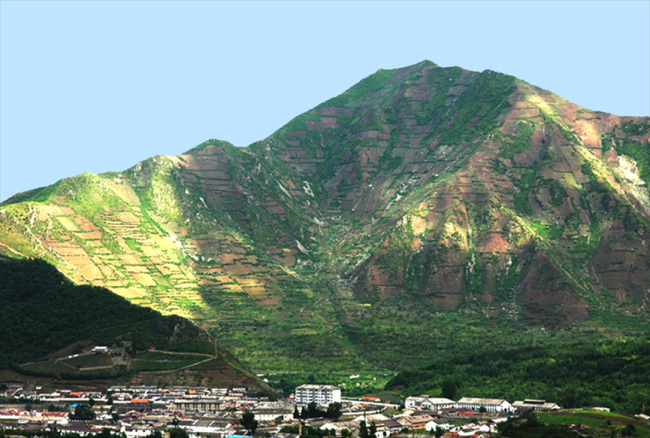Seoul reinforces plan to help restore N. Korean forests
By Korea HeraldPublished : Oct. 10, 2012 - 20:01

Over 30 percent of North’s forests devastated, need urgent recovery: KFS
The South Korean government has drawn up a proposal to help reforest the North more systematically, as forests there continue to disappear.
About 2.7 million hectares of forest in North Korea ― an area about the size of Pyongyang ― has disappeared in the past 20 years.
According to the 2011 State of the World’s Forests report published by the Food and Agriculture Organization of the United Nations, only 47 percent of the land in North Korea, 5.6 million ha, was forest in 2010, which was a decrease by 30.8 percent compared to the 8.29 ha in 1990.
Satellite photos seen in 2008 by the Korea Forest Research Institute also showed that about 32 percent (2.84 million ha) of the total forest area (89.9 million ha) in the North at the time had been devastated.
Measurements differ between institutions because the North does not share its official figures. It is generally agreed, however, that land designated as forest has only about half the amount of trees compared to the South.
Taking into account the serious state of forests in the North, the Korea Forest Service recently announced plans to help out. The ultimate goal is to revive 2.84 million ha of forest that has been lost to excessive lumbering.
“Restoring North Korea’s forests is a mission for our generation. We will continue on the project in cooperation with the North in a humanistic level as well as to cut down the future unification cost,” said KFS Minister Lee Don-koo said in a statement.
The core of the plan is to restore forests in steps, starting from the unrestricted areas where the Northern regime more willingly opens. Taking a step further from simply planting trees, The KFS plans to bring synergy effects by linking the afforestation with creating energy and food resources. The plan also suggests cooperation between the South and the North ― the first providing resources and technology and the latter land and human resources ― as well as revision of related laws to offer stable support to the restoration of forests in the North.
The details of the plan includes benchmarking the afforestation project carried out here in the 1970s, when forests were as badly devastated as in today’s North. Burnt fields were restored as forests or turned into arable land in 1974 and a new 210,000 ha forest was planted to provide fuel to farms through the project.
Citizens who took part in the project were provided with both a new planting job and food, as the government offered flour to the participants.
The KFS thinks a similar project would work out well in the North, as the main reason for deforestation is excessive forest clearing projects in the late 1970s and early 1980s to create fields for food. In the 1990s, the excessive lumbering was done for fuel.
The decrease of forests in the North are affecting the biodiversity and showing signs of desertification. Only 30 to 40 percent of trees may survive in the malnourished soil in the North today, said the KFS in a statement, while about 90 percent can survive in the South.
Experts expect that deserted forests will lead to financial problems in the North as well as affect the South in many ways ― from landslides to the increased unification costs.
Several municipal governments and private organizations have supported the afforestation in the North so far, but the KFS pointed out that results were not so successful although the projects did contribute in raising public awareness about the issue.
“Maintenance is extremely essential in case of afforestation. The projects could do nothing but show limits because the North only demanded support for materials and tools and refused consistent monitoring,” said the KFS spokesperson said.
Government-level cooperation projects were also conducted in 2005, 2006 and 2007 to plant trees and get rid of harmful forest insects, but were not well continued because the North refused or because of strained political or military situations between the two Koreas.
“Nevertheless, the government policy is to restart the afforestation project on a humanitarian level, as it is a nonpolitical issue and could also contribute to building trust between the nations,” said the KFS.
Based on the basic plan established in 2009 through discussions with the Unification Ministry and the Agriculture Ministry, the KFS researched how to stably and efficiently conduct the afforestation and reforestation project in the North. The organization said that it was also seeking ways to establish and revitalize support systems from the private sector or municipal governments as well.
The KFS also vowed to reinforce the combat capabilities towards climate change through international organizations. With the KFS in the center, the Presidential Committee on Green Growth, the Unification Ministry and the National Intelligence Service will jointly discuss and conduct international organization-related projects in Korea.
As the first step, the KFS signed a memorandum of understanding with the FAO in Sept. 2009 to jointly proceed the project to reinforce North Korea’s competence to cope with climate change, also taking into account that training forestry professionals in the North is essential to carry out the project. The KFS also recently hosted an international symposium in Beijing, China, to discuss how to reinforce the capabilities of underdeveloped countries to cope with climate change.
By Park Min-young (claire@heraldcorp.com)
The South Korean government has drawn up a proposal to help reforest the North more systematically, as forests there continue to disappear.
About 2.7 million hectares of forest in North Korea ― an area about the size of Pyongyang ― has disappeared in the past 20 years.
According to the 2011 State of the World’s Forests report published by the Food and Agriculture Organization of the United Nations, only 47 percent of the land in North Korea, 5.6 million ha, was forest in 2010, which was a decrease by 30.8 percent compared to the 8.29 ha in 1990.
Satellite photos seen in 2008 by the Korea Forest Research Institute also showed that about 32 percent (2.84 million ha) of the total forest area (89.9 million ha) in the North at the time had been devastated.
Measurements differ between institutions because the North does not share its official figures. It is generally agreed, however, that land designated as forest has only about half the amount of trees compared to the South.
Taking into account the serious state of forests in the North, the Korea Forest Service recently announced plans to help out. The ultimate goal is to revive 2.84 million ha of forest that has been lost to excessive lumbering.
“Restoring North Korea’s forests is a mission for our generation. We will continue on the project in cooperation with the North in a humanistic level as well as to cut down the future unification cost,” said KFS Minister Lee Don-koo said in a statement.
The core of the plan is to restore forests in steps, starting from the unrestricted areas where the Northern regime more willingly opens. Taking a step further from simply planting trees, The KFS plans to bring synergy effects by linking the afforestation with creating energy and food resources. The plan also suggests cooperation between the South and the North ― the first providing resources and technology and the latter land and human resources ― as well as revision of related laws to offer stable support to the restoration of forests in the North.
The details of the plan includes benchmarking the afforestation project carried out here in the 1970s, when forests were as badly devastated as in today’s North. Burnt fields were restored as forests or turned into arable land in 1974 and a new 210,000 ha forest was planted to provide fuel to farms through the project.
Citizens who took part in the project were provided with both a new planting job and food, as the government offered flour to the participants.
The KFS thinks a similar project would work out well in the North, as the main reason for deforestation is excessive forest clearing projects in the late 1970s and early 1980s to create fields for food. In the 1990s, the excessive lumbering was done for fuel.
The decrease of forests in the North are affecting the biodiversity and showing signs of desertification. Only 30 to 40 percent of trees may survive in the malnourished soil in the North today, said the KFS in a statement, while about 90 percent can survive in the South.
Experts expect that deserted forests will lead to financial problems in the North as well as affect the South in many ways ― from landslides to the increased unification costs.
Several municipal governments and private organizations have supported the afforestation in the North so far, but the KFS pointed out that results were not so successful although the projects did contribute in raising public awareness about the issue.
“Maintenance is extremely essential in case of afforestation. The projects could do nothing but show limits because the North only demanded support for materials and tools and refused consistent monitoring,” said the KFS spokesperson said.
Government-level cooperation projects were also conducted in 2005, 2006 and 2007 to plant trees and get rid of harmful forest insects, but were not well continued because the North refused or because of strained political or military situations between the two Koreas.
“Nevertheless, the government policy is to restart the afforestation project on a humanitarian level, as it is a nonpolitical issue and could also contribute to building trust between the nations,” said the KFS.
Based on the basic plan established in 2009 through discussions with the Unification Ministry and the Agriculture Ministry, the KFS researched how to stably and efficiently conduct the afforestation and reforestation project in the North. The organization said that it was also seeking ways to establish and revitalize support systems from the private sector or municipal governments as well.
The KFS also vowed to reinforce the combat capabilities towards climate change through international organizations. With the KFS in the center, the Presidential Committee on Green Growth, the Unification Ministry and the National Intelligence Service will jointly discuss and conduct international organization-related projects in Korea.
As the first step, the KFS signed a memorandum of understanding with the FAO in Sept. 2009 to jointly proceed the project to reinforce North Korea’s competence to cope with climate change, also taking into account that training forestry professionals in the North is essential to carry out the project. The KFS also recently hosted an international symposium in Beijing, China, to discuss how to reinforce the capabilities of underdeveloped countries to cope with climate change.
By Park Min-young (claire@heraldcorp.com)
-
Articles by Korea Herald







![[Graphic News] Number of coffee franchises in S. Korea rises 13%](http://res.heraldm.com/phpwas/restmb_idxmake.php?idx=644&simg=/content/image/2024/05/02/20240502050817_0.gif&u=)



![[Robert J. Fouser] AI changes rationale for learning languages](http://res.heraldm.com/phpwas/restmb_idxmake.php?idx=644&simg=/content/image/2024/05/02/20240502050811_0.jpg&u=)







